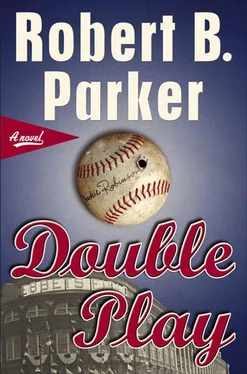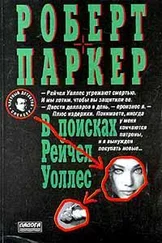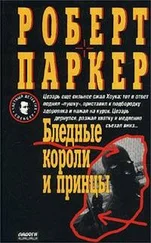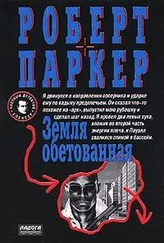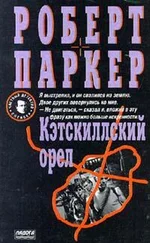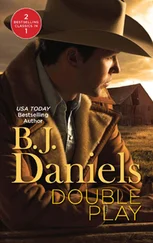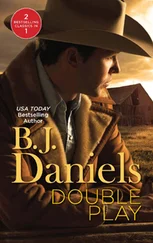“Boston,” he said.
“Home on leave.”
“Sort of.”
“Sort of?”
He told her that his mother lived here but they didn’t get along. He told her he had rented a room on Huntington Avenue.
“You have your orders yet,” she said.
The band played “There Are Such Things,” and they slowed. She pressed herself against him.
“First Marines,” he said.
“Sounds like the Pacific to me,” she said.
“Yes.”
Her face was near his as they danced. She smelled like good soap.
“Wow,” she said. “I’d be so scared.”
“I guess I’ll be scared,” he said. “I guess everybody is.”
“But you do it.”
“Sure.”
“That’s so brave,” she said.
He pressed his hand into the small of her back as they danced. A female vocalist sang, “I don’t want to walk without you, baby...”
“And you have no one to worry about you?”
“I’ll worry about me,” he said.
She laughed softly. He could feel her breath on his neck.
“Well, dammit,” she said. “I will, too.”
She had an apartment on Park Drive not far from the Harvard Medical School area where she worked. He looked around: small foyer, living room on the right, bath next to it, bedroom on the left, tiny kitchen ahead.
“You got your own apartment?” he said.
“Sure.”
“You live alone here?”
“Yes. Why?”
“I been living in a barracks with a lot of guys. Alone seems nice.”
“As long as it’s not too alone,” she said. “Would you like a drink?”
“Sure.”
She brought out some Vat 69 scotch and some ice and a glass siphon with a lacy silver design on it. She poured two scotches, added some ice, and squirted the carbonated water from the siphon. She handed him one.
“Come on, Mr. Marine, sit with me on the couch.”
He sat. She sat beside him. Her bare legs gleamed. He drank some scotch. It was good. His drinking experience was mostly beer up till now.
“How old are you?” she said.
“Eighteen.”
He almost called her ma’am, but caught himself.
“Wow,” she said. “I’m twenty-five.”
He didn’t know what to say about this, so he simply nodded.
“What do you think about that?” she said.
“Doesn’t seem to matter,” he said.
“No,” she said. “It doesn’t seem to.”
“Were you in high school until the Marines?” she said.
“No. I quit school,” he said. “I was doing high ironwork, with a bunch of Mohawk Indians.”
“High iron?”
“Yeah, you know, skyscrapers. Mostly the Mohawks do that stuff, but they needed a guy quick, and I was willing.”
“My God,” she said.
“You get used to it,” he said. “My father did it too.”
“And you don’t get along with your mother?”
“No,” he said.
“Because?”
He could feel the length of her thigh against his as she sat beside him.
“A lot of booze,” he said. “A lot of men.”
“How awful,” she said.
He shrugged.
“She does what she does,” he said. “I do what I do.”
She shifted on the couch and tucked her bare legs beneath her and turned toward him, holding the glass of scotch in both hands.
“And what do you do?” she said.
“Lately,” he said, “I been learning to shoot a rifle.”
“There are better things,” she said.
“Not where I’m going.”
She smiled.
“No, but you’re not there yet.”
He nodded. They were close now, and carefully he put his arm around her. She rested her head against his shoulder.
“You may be young but you seem awfully big and strong,” she said.
“High iron does that,” he said. “You should have seen my father.”
“I should,” she said. “Could you talk to him?”
“Yes.”
“But not your mother.”
“No.”
“So you’re going off to war with no one to talk to.”
“I’m talking to you,” he said.
“But you must have a lot of feelings bundled up in there,” she said. “You need to be able to let go, let it all out.”
“Marines mostly teach you to shut up about stuff,” he said.
“Well, I will teach you differently,” she said. “Have you ever had intercourse?”
He was silent for a moment. His impulse was to claim that he had, but there was something here, something between them. He didn’t want to lie.
“No,” he said. “I haven’t.”
“Then it’s time,” she said and leaned toward him and kissed him on the mouth.
In the summer of 1941, when I was nine, my father used to work around the yard on Sunday afternoons wearing a white undershirt and bear pants. The bear pants were overwashed khakis that he was wearing when, as a young man in Maine, he had shot a bear. The bear’s blood still stained the pants, and they became known as the bear pants. The bear pants were, for me, though I would not have known how to say it, totemic, the tangible vestige of a warrior past no longer available.
We lived ninety miles west of Boston, in Springfield, in a white house with a screened back porch. My father used to play the radio loudly on the porch while he worked in the garden or clipped the hedge, so he could listen to the ball game. There were still blue laws in Boston in the days before the war, and baseball was not broadcast on Sundays. So while he staked his tomato plants and weeded among his string beans, my father listened to the Brooklyn Dodgers on WHN, which came clear channel up the Connecticut River Valley from New York.
Normally on Sundays teams played a doubleheader, so all the slow summer afternoon I would hear Red Barber’s play-by-play with Connie Desmond, until the sound of it became the lullaby of summer, a song sung in unison with my father. I saw Ebbets Field in my imagination long before I ever saw the bricks and mortar. The rotunda, the right field screen with Bedford Avenue behind it. Schaefer Beer, Old Gold cigarettes, the scoreboard and Abe Stark’s sign. Brooklyn itself became a place of exotica and excitement for me, and the perfumed allure of New York City, gleaming between its rivers, wafted up the Connecticut Valley and lingered in my nostrils as it has lingered since, years before my father took me there and I found, to my adolescent delight, that it was what I’d imagined.
I learned something of triumph when the Dodgers won the National League pennant in 1941. I did not know who won in 1940. I learned years later that it was Cincinnati. I did not know any players in 1940. By the time I was nine, in September of 1941, the names of the Dodgers marched through my mind like lyrics: Dolph Camelli, Billy Herman, Pee Wee Reese, Cookie Lavagetto, Ducky Medwick, Pete Reiser, Dixie Walker, Mickey Owen. The pitchers: Higbe and Wyatt and Hugh Casey. And I learned something about tragedy in the World Series when Mickey Owen missed the third strike on Tommy Henrich to give the Yankees another chance to win, which they did. I regret it still.
Listening to the scores — Pittsburgh 4, Chicago 2; Cleveland 8, Detroit 1 — I felt connected to all the great cities I’d never seen, across the vast rolling reaches of the Republic, connecting me with them and the people there watching the games. I saw them. I smelled the steamy heat in their streets. Philadelphia, Washington, Cincinnati.
In that last summer before the war, listening to the radio while my father wore his bear pants and worked in the yard, it was as if I learned the shaman incantations of a magic sect. The sound of the bat, amplified by the crowd mike. The call of the vendors, the organ playing, the sound of the fans yelling things you could never quite make out. The effortless and certain cadences of the play-by-play announcers, all of it became like the sound of a mother’s heartbeat to her unborn child, the rhythm of life and certainty. The sound of permanence.
Читать дальше
